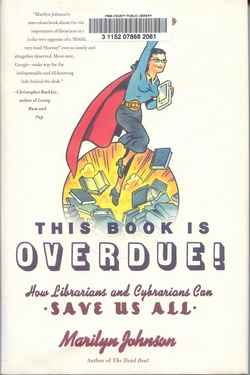This
Book is Overdue
Marilyn Johnson

“Few principles rouse librarians more than the right of free access to information and the right to privacy in our choices. If a librarian phones our house to say a book we've requested has arrived, she will not tell our husband that Confronting the Batterer is in; she won't tell our children we can pick up that copy of How to Break Bad News. What we searched for on library computers, from information about cancer or transsexuality to instructions on how to build a pipe bomb, was our own business. As recently as the 1980s, the FBI urged librarians to report people with Eastern European-sounding accents or names who were looking at scientific material; they called it the FBI Library Awareness Program, and librarians en masse resisted it....”
This passage comes from writer Marilyn Johnson's latest work, titled This Book is Overdue! It's a terrific look at the vital importance of libraries and librarians, and the service they render to readers everywhere. Subtitled How Librarians and Cybrarians Can Save Us All, it's also an intriguing introduction to the world of on-line libraries. Moving on:
“...There are library confidentiality laws in place in forty-eight U.S. States, and rulings favorable to library confidentiality in the other two (Hawaii and Kentucky), and policies have been developed at most libraries to guard against 'unreasonable searches and seizures' – everybody remembered that amendment, but librarians had developed muscles defending it. If an agent of the government wanted to know what we'd been reading, he had to show 'probable cause, supported by Oath or affirmation,' or a good librarian would stand between our records and his badge.”
Librarians area also archivists, as Johnson notes:
“And who is worth saving? Ah, that's the question. Certainly we are worth saving ourselves, whoever we are, if only for our family's sake. If we are helping build or create something, save a town landmark, fight for freedom, launch a field of study; if we survive a disaster or witness a miracle – if we do anything with our lives besides watch television – we might want to document it somehow and save the evidence. Then again, forget that qualifier; someone who did nothing but watch TV might be able to tell us a great deal about the history of television in the twenty-first century. We are all living history, and it's hard to say now what will be important in the future. One thing's certain, though: if we throw it away, it's gone.”
From the Library of Congress to cyberspace, the author brings to life these pragmatic idealists who fuse the tools of the digital age with their love for the written word and their enduring values of free speech, open access, and highest quality assistance to anyone in need. Be sure to read all about them and their work!
All Rights Reserved.